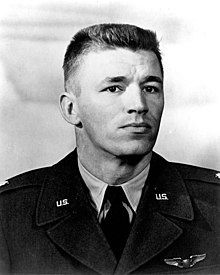Charles Joseph Loring Jr. | |
|---|---|
 Major Charles J. Loring Jr., U.S. Air Force | |
| Born | October 2, 1918 Portland, Maine, United States |
| Died | November 22, 1952 (aged 34) Kimnhwa, Korea |
| Place of burial (Markers Only) | |
| Allegiance | United States |
| Service | United States Army Air Forces United States Air Force |
| Years of service | 1942–1952 |
| Rank | Major |
| Service number | |
| Unit | 22nd Fighter Squadron 36th Fighter-Bomber Squadron 80th Fighter-Bomber Squadron |
| Battles / wars | World War II Korean War † |
| Awards | Medal of Honor Distinguished Flying Cross Purple Heart (2) Air Medal (12) Taegeuk Order of Military Merit |
Charles Joseph Loring Jr. (October 2, 1918 – November 22, 1952) was a fighter pilot in the United States Army Air Forces in World War II, and later in the United States Air Force in the Korean War. Loring rose to the rank of major and posthumously received the Medal of Honor for his heroic actions on November 22, 1952, above Kunwha, Korea during a close air support mission.
Born in Portland, Maine, Loring joined the United States Army in 1942 and was quickly selected to undergo pilot training. He spent several months stationed in Puerto Rico before being transferred to duty in the United Kingdom in 1944. There, he flew 55 combat missions in P-47 Thunderbolt aircraft before being shot down and serving six months as a Nazi German prisoner of war. By the outset of the Korean War, Loring was working in an administrative role in the United States, but by 1952 had been transferred to combat duty in Korea.
During a patrol on November 22, 1952, Loring was leading a flight of F-80 Shooting Stars of the 80th Fighter-Bomber Squadron in an attack on a Chinese artillery position. During the run, his aircraft was struck by intense and accurate anti aircraft fire. Rather than abort the mission, Loring continued his diving run, aiming his disabled aircraft at the position and obliterating it, killing himself in the process. After his death, Loring was awarded the Medal of Honor and made the namesake of Loring Air Force Base in Limestone, Maine.
- ^ "Air Force Award Cards [Air Medal]". U.S. National Archives and Record Administration. Retrieved May 27, 2024.
- ^ Korean War Honor Roll listing: Charles J. Loring entry, American Battle Monuments Commission, archived from the original on August 6, 2011, retrieved August 7, 2011